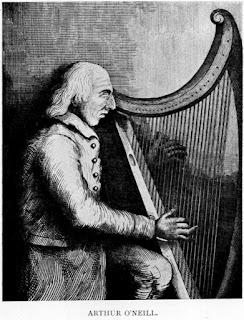14 July 1792 : The Belfast Harp Festival ended on this day. It was held with the intention of bringing together Irelands finest harpers and to award prizes to the best players amongst them. Organised by a committee chaired by Dr James MacDonnell, Belfast’s leading physician and who could play the harp himself which included Henry Joy the editor of the Belfast News-Letter [uncle of Henry Joy McCracken] and Thomas Russell, the ‘man from God knows where’ its aim was ‘to revive and perpetuate the Ancient Music and Poetry of Ireland’. It took place in the in the Assembly Rooms at The Exchange at the corner of North Street and Waring Street.
‘Ten traditional Irish harpers (including one woman) and a Welshman were brought together to compete for prizes. They ranged in age from 97-year-old Denis Hempson from Magilligan, Co. Derry, who played the harp in the old style of plucking with the fingernails, to fifteen-year-old William Carr from County Armagh. Six of them, including Hempson, were blind. First prize went to Charles Fanning from County Cavan and second to Arthur O’Neill from County Tyrone, though they were all given a payment.’
https://www.historyireland.com/on-this-day-60/
Not all listeners were enamoured with what they heard though, dropping in to hear them Wolfe Tone wrote in his diary: ‘The harpers again. Strum, strum and be hanged.’
But this gathering did have important cultural consequences as amongst those in attendance was the young musician Edward Bunting who the committee had commissioned to write down the music as it was being played, which he duly did, along with a mine of information about the harpers themselves and harp lore. His collection, arranged for piano, was subsequently published in three volumes, notably the final volume popularly known as ' The ancient music of Ireland’ (1840).
‘This was to prove by far the most significant; it can fairly be described as the most seminal and influential publication in the history of Irish music. It inaugurated a long tradition of systematic music collection which has continued to flourish in Ireland.’
https://www.dib.ie/biography/bunting-edward-a1117
Thomas Moore later drew on Bunting’s pioneering work, adding matchless words to the collected airs in his immensely popular Irish Melodies.
A History of Ireland in 250 episodes Jonathan Bardon
Image 1 : The Blind Harper Arthur O’Neill who played at the Festival.


No comments:
Post a Comment